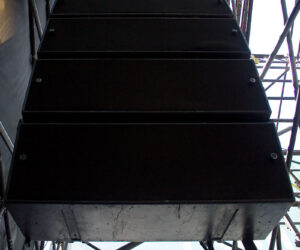I’ve found that when you introduce yourself as an audio engineer, people expect you to know things.
The word “engineer” seems to impress them. Their eyebrows raise, and they immediately assume you’re good at math. (I’m passable.)
Even if you use the less impressive and more user-friendly title of “sound person,” the standard response – one so common it’s become a running joke amongst sound people – still indicates the expectation of knowledge: “So you know what all those knobs do?” (No, I only adjust the red ones.)
Unlike other fields of engineering, we need to no license to ply our trade. There’s no state appointed board to verify us. We either get results or we don’t. The proof is in the mix.
With the expectation of knowledge but no official vetting process, it’s logical to ask oneself “How much do I really know about this?” For example, I’d say it’s probably reasonable to assume that most live audio professionals have some basic knowledge of how a loudspeaker works.
But how many do you think would be comfortable explaining the concept in a classroom setting? How many would include a mention of Faraday’s law of induction? Likely far fewer, and I bet that only a handful would know the formula to find the voice coil’s inductive reactance. (It’s 2πfL.)
Of course, we don’t need this formula in order to mix a show. (And conversely, many people who do know this formula could not mix a show.) So why does it matter? Well, it certainly deepens our own understanding of what’s going on.
This helps us do our jobs better and also has the convenient benefit of assuring others that we know what we’re doing. Would you want to hire an engineer who has designed a bridge but can’t explain why it stays up? Artists rely on us to keep the audio situation under control, and clients and production managers want to know that their money is being well spent.
Like in any other business, if we are asking the “powers that be” to buy us something, we need to be able to explain what it does and why we need it. (Side note: in situations where a less expensive alternative would be satisfactory, be sure to say so. That way, when you find yourself in a situation in which the substitute just won’t do, you’re more likely to get what you asked for.)
Inherent Values
Engineers are, I think, pathological deconstructors. I don’t mean this in a negative way, and I absolutely include myself in this group. It’s a mindset. Nothing fascinates me more than trying to figure out how something works. What’s under the hood? What makes it tick?
I was, to the delight of some of my teachers (and the dismay of others, I’m sure), the “why” child. Just telling me a fact was never enough. I wanted to know why.
I think I was about eight when I decided to build a solar oven. When my mother found me squatting in the backyard over a water-filled bowl covered in aluminum foil, she could have said “That won’t work.” But she didn’t. She gave me a carrot to cook.
So I found out for myself that it didn’t work, and also why it didn’t work. Foil reflects heat, it doesn’t absorb it. The fact that I remember this so clearly speaks to the power of “why.” I doubt I’d be telling the story if it ended with “That won’t work. Go clean your room.”
So there’s an inherent value in learning something, which means there’s an inherent value in not knowing something, for we must “not know” before we can learn. This is often the sticking point for people. It can be hard to say “I don’t know.”
Some perceive such an admission as a sign of weakness, but I believe it’s the opposite. It’s the opportunity to learn something, which is good because afterwards we’ll know more. Never learning means continuing to function with our existing level of knowledge.
At the rate our field is advancing, it’s certainly not an optimal approach. I see how some might find the relentless march of technological progress overwhelming, although I would suggest [to them] that they’re in the wrong field. I, for one, find it exciting to be involved in a field in which there’s always more to learn.
Giving Permission
During one of my first visits to an online audio forum, I posted a technical question. I still remember the response verbatim: “I’m not sure why you need to know it at that level.” What’s the point of an attitude like that on a tech forum?
The definition of a forum – “a meeting place for discussion among experts” – shouldn’t inspire visions of a bunch of squabblers who pretend to know everything – the blind leading the blind – but all too often, this is how it ends up
Compare this response to the one I received the very first time I called my (now) mentor, Ethan Winer. I owned his book (The Audio Expert), I’d read his articles, and I’d seen his videos. I was thoroughly convinced he knew just about everything.
My question regarded the phase offset between resistive and capacitive elements at the corner frequency of an RC filter. He said “I understand what you’re asking, but I don’t know the answer.” How unexpected – how could he not know?
The best way to describe my feelings at this point is to compare it to the time I spent two hours etching all of the silver powder off of the screen of my Etch-A-Sketch: “Well, now what?” What surprised me is not that he didn’t know, but that he admitted it so freely.
This was a huge revelation – if subject matter experts can admit when they’re stumped and not burst into flames or turn to pillars of salt, so can I. There’s a wonderful freedom that sets in as soon as you give yourself permission to not know – the path to knowing becomes clear. It’s not about who is right, it’s about what is right. (We eventually got the answer from a professor at MIT, so we both learned something.)
Broader View
So how can we reap actionable benefits from this philosophical approach of being comfortable with the admission that there is more knowledge to be gained in a situation?
I recall a forum thread in which a front of house engineer was complaining that a popular new digital console reacted poorly to rising temperatures at an outdoor festival. As the day grew hotter, he claimed, the console’s sound became “tight” and “pinched,” and had anyone else experienced the same issue?
What followed was much postulating about accumulator bit depths and floating point DSP and fan speeds. All of the console gurus were so eager to appear knowledgeable that every single one failed to realize that they were operating on a very basic and very faulty premise – that the console was responsible.
The real culprit was “power compression.” Also known as thermal compression, it occurs when voice coils heat up. Resistance rises, SPL falls, the engineer pushes the levels in response and generates even more heat. The HF drivers usually get the worst of it, so the system’s response tilts toward the LF. The system sounds like it’s working too hard, which would absolutely cause the aforementioned complaint.
This is a common, well-understood issue, but to get there requires a step back. We must be willing to take a wider view and to seriously entertain the possibility that something we “know” to be true actually isn’t.
I have a theory that “false certainty” wastes a lot of money and time in the production world. I’ve seen a $10,000 lighting console declared faulty when the actual culprit was a polarity inversion in the DMX data cable.
I’ve seen a loudspeaker’s HF driver pronounced blown when the actual issue was that the cable was accidentally connected to the biamp input, leaving the HF driver without any input signal. And the $2,000 condenser mic works fine, but not if your in-line ground lift adapter breaks the DC return path for phantom power.
It’s easy to pronounce gear “broken” when in fact we don’t understand enough about how it works. The number of support calls I’ve taken, for which the solution was to press a button or plug something in, is testament to this. (Of course, sometimes the gear is actually broken.) But I posit that there are precisely zero situations in which our chances of success would not be improved by deepening our own understanding.
Key Q&A
If you’re like me, you laugh at old photographs of big, bulky, totally obsolete audio gear. “I can’t believe we used to do it that way.”
But it wasn’t funny at the time, it was the best they could do. Sure, we can do better now, but I think 30 years from now we’ll look back at today’s rigs and laugh for the same reason. Don’t think for a second that we’ve reached the summit.
The only thing that got us from 1980 to now, and that will carry us any further, is the admission of the possibility that there might be more to learn about this complex, crazy, beautiful field we call live sound reinforcement.
Someone has to ask “Is this really the best way to do it?” And someone has to answer “I don’t know.”















